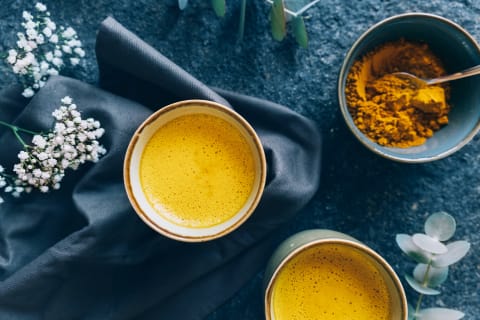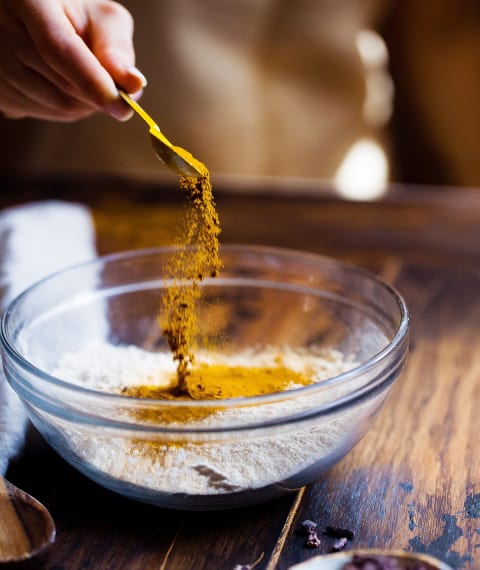Advertisement
8 Health Benefits Of Turmeric + 11 Ways To Make Sure You Get Enough Daily


Turmeric is a powerful antioxidant herb that’s been used for thousands of years to promote whole-body health and holistic well-being.*
This ancient Ayurvedic root, which is a cousin to ginger, is native to Southeast Asia and sometimes called "Indian saffron" because of its beautiful golden color. It also gives curry powder (and just about any other food it's added to) its yellow pigment.
If you’ve done even a little clicking around the wellness corner of the internet, you’ve likely encountered articles about turmeric and its awesomeness, but knowing how to actually fit it into your everyday life? Not always so obvious.
Maybe you have a few questions around turmeric, like: Is taking a turmeric supplement better than simply adding it my meals? And what the heck is the difference between turmeric and curcumin? We'll answer these, and give you a list of turmeric benefits to boot!
Read on to learn if turmeric and curcumin are created equal, whether a daily turmeric is right for you, and eight ways turmeric can boost your health and wellness.*
What are turmeric & curcumin?
Turmeric contains a number of bioactive compounds called curcuminoids that help deliver the revered botanical's vast health benefits—and its vibrant hue. The principal (and most popular) curcuminoid, curcumin, has been extensively studied1 for its anti-inflammatory actions, antioxidant activity, and overall impressive list of proactive health benefits2.*
Supplement vs. diet: How should I use turmeric?
Many curcumin and turmeric studies focus on very concentrated preparations of turmeric supplements (e.g., in powder, tablet, and extract form). This is because a daily, efficacious dose of turmeric is a fantastic way to ensure you're getting the most out of the traditional herb.
For targeted support, a high-quality daily turmeric supplement (like mbg's turmeric ginger+) is a simple and effective way to support a healthy inflammatory response and boost antioxidant actions to promote whole-body health.*
That said, adding the powerhouse herb to your day-to-day diet is a fun way to flavor your dishes and sprinkle in some health benefits, too. So, we pose this question: Why choose just one when you can have both?!
To support her own health, physician and Ayurveda expert Avanti Kumar-Singh, M.D., likes to take a turmeric supplement and include turmeric in her diet: "For targeted support, I prefer a supplement that is pure and contains black pepper for greater bioavailability. For everyday support, maintenance, and flavor, I prefer cooking with turmeric powder or fresh turmeric root," she shares.
8 benefits of turmeric.
Thanks to turmeric's potent antioxidant and inflammatory response balancing actions, there are myriad ways the Ayurvedic spice promotes your health and longevity.*
A daily turmeric supplement can help you get all of these health perks, but I've also included some culinary inspiration for each of turmeric's benefits—so you can support holistic well-being with supplementation and food alike.* (A win for your whole-body health AND taste buds!)
Here are eight ways turmeric can support holistic health:
It's a powerful weapon against pro-inflammatory pathways.
The effect of turmeric's powerful inflammatory regulating properties (which are mainly attributed to the bioactive compound curcumin) offer a protective benefit.*
Curcumin helps modulate inflammatory pathways in multiple ways, which is why turmeric is such a powerful botanical for whole-body health.* According to a 2011 scientific review from Natural Product Reports, curcumin directly binds to pro-inflammatory cytokines3 (e.g., TNF alpha, IL-1 beta, and IL-6—to name just a few) to inhibit their expression.*
In addition to regulating that activity of pro-inflammatory mediators directly, curcumin also interacts with transcription factors4—such as nuclear factor kappa B—to influence gene expression and effectively turn pro-inflammatory genes "off."*
Anti-inflammatory salad dressing
To make it easy to add in, use turmeric in a go-to salad dressing. I love to whisk together white miso paste, tahini, apple cider vinegar, and turmeric for a simply delicious and powerful dressing (check out the full turmeric salad dressing recipe here).
It kicks free radical butt.

Turmeric helps increase antioxidant capacity and combat oxidative stress—which is especially beneficial for immune support, brain function, and heart health.* According to a 2015 Journal of Functional Foods systematic review and meta-analysis5, curcuminoids have been shown to increase serum concentrations of "master antioxidant" glutathione and protect fatty acids by reducing lipid peroxidation.*
Turmeric’s antioxidant properties also benefit our appearance by protecting the skin from free radicals6, like environmental pollutants and other modern toxins.* So, yes—turmeric kicks free radical butt, and helps support overall oxidative balance.*
Antioxidant-boosting bevvy
Add a teaspoon of turmeric to your favorite green juice or smoothie for an antioxidant boost.
It helps boost your immune system.
Curcumin’s antioxidant and anti-inflammatory properties7 make it a health-promoting powerhouse.* While curcumin is not absorbed that well into the bloodstream, consuming it with black pepper enhances absorption8, thanks to a compound in the pepper called piperine.*
(You can find piperine alongside full-spectrum turmeric in mbg's turmeric ginger+—plus ginger root extract, which is another superstar botanical for immune support).*
One of my favorite ancient Ayurvedic remedies is an immune-supporting tea with turmeric, ginger, and black pepper.
Immune-boosting turmeric tea
Add one teaspoon of turmeric to 12 ounces of water and bring to a boil. Take the water off the heat and add 1/4 teaspoon each of ground ginger and black pepper. You can also make this tea into golden milk by using coconut milk instead of water.
Pro tip: Since curcumin is fat-soluble, consuming it with a fat-containing food or beverage helps you absorb it more effectively.
It supports joint health.
The healthy inflammatory response benefits of curcumin can help promote joint strength, function, and mobility by reducing pro-inflammatory biomarkers9 (i.e., ESR and CRP) relevant to joint health.*
It's also beneficial to the musculoskeletal system as a whole: In a 2021 Oxidative Medicine and Cellular Longevity review, turmeric supplements were found to help improve muscle performance and promote healthy muscle recovery10.*
Joint support smoothie
I recommend a smoothie packed with soothing, anti-inflammatory superfoods to my clients struggling with suboptimal joint health. My go-to combo is frozen wild blueberries, roasted or steamed beets (another antioxidant-rich food11), and turmeric. If you want to make it a meal, add your favorite plant protein.
It protects your heart.

Thanks to their inflammatory balancing and antioxidant actions, curcumin and turmeric demonstrate a number of cardioprotective properties.* According to a 2020 Frontiers review, curcumin even has the ability to support endothelial function12—i.e., vascular relaxation and contraction in the heart and blood vessels.*
Heart-healthy granola
Reap turmeric's cardioprotective benefits in a delicious way by cooking it into a fiber-rich, whole-grain dish—like this turmeric, apricot, and pistachio granola.
It helps promote a healthy gut.
Though we often associate turmeric with spicy foods like curry, it's actually quite soothing for digestion13 and overall gut health.* In fact, a 2020 scientific review from Nutrients reveals that curcumin even helps promote a healthy gut microbiome14 by supporting the growth of beneficial bacteria strains.*
Gut-soothing kitchari
Kitchari is a cleansing Ayurvedic dish that's traditionally made with split mung beans, white basmati rice, and various veggies and spices. This green kitchari recipe is packed with yummy spices (like cumin, coriander, ginger, and yes—turmeric) and features a diverse list of ingredients to support a healthy gut microbiome.
It delivers mood support.
Curcumin has also been found to have an impact on brain-derived neurotrophic factor (BDNF), which affects cognitive function, memory, and mood.* In a 2019 meta-analysis from Nutrition Research, short-term turmeric supplementation (i.e., eight to twelve weeks) was found to significantly increase serum BDNF levels15.*
Evidence from animal studies indicates that curcumin may influence the production of mood-boosting neurotransmitters16 (i.e., serotonin and dopamine) as well, though research in this field is still ongoing.*
Mood-boosting savory oats
Because tryptophan is a precursor to serotonin, getting enough of this amino acid can also help support a stable mood. While it’s mostly found in animal protein, oats are a great plant-based source. (Savory oatmeal, anyone?)
My go-to savory oats spice combo is turmeric, ginger, black pepper, paprika, and garlic powder. Add an egg for staying power and veggies for extra nutrients, and you’ve got a meal!
It improves long-term cognitive function.
Thanks to its ability to cross the blood-brain barrier, curcumin boasts neuroprotective properties12 to promote healthy brain function and longevity.*
In addition to mood support benefits, BDNF also plays a key role in maintaining cognitive function later in life17, which means increasing levels of BDNF is one more way curcumin can help promote brain health as we age.*
Brain longevity breakfast
Turmeric goes great with eggs (another excellent brain food). Shake some into a veggie omelet or scrambled eggs to support your cognitive function throughout the day—and be sure to add lots of veggies for added phytonutrients!
Dosing: How much turmeric should I take?
Generally speaking, taking a daily turmeric supplement is the best way to ensure you're getting all the curcuminoids you need to reap turmeric's many health benefits.* While there's no official recommendation on how much turmeric to take, on average, most supplements contain 500 milligrams of turmeric or more—but form matters here!
Look for a bioavailable form of turmeric that will allow your body to absorb as many curcuminoids as possible so you can optimize your health benefits. A supplement with full-spectrum turmeric root extract and polar-nonpolar-sandwich (PNS) technology (like mbg's turmeric ginger+) enhances bioavailability tenfold compared to common turmeric forms ensure you're getting the most out of turmeric's many perks.*†
When adding turmeric spice or root to your meals, always make sure to add black pepper to enhance its bioavailability.
The takeaway.
From antioxidant benefits to neuroprotective properties, turmeric is a beneficial botanical you'd be smart to add to your spice rack or your supplement regimen.*
For targeted health support, a daily turmeric supplement like mbg's turmeric ginger+ with PNS technology and piperine from black pepper extract for enhanced bioavailability is a smart, effective way to ensure you're reaping all amazing health benefits this legendary herb has to offer.*
† Acumin™ research has demonstrated superior bioavailability, curcuminoid serum response, and stability compared to other common forms of turmeric root extract (e.g., volatile oil, phospholipid/liposomal, and standard 95% curcumin).
17 Sources
- https://www.ncbi.nlm.nih.gov/pmc/articles/PMC3535097/
- https://www.ncbi.nlm.nih.gov/pmc/articles/PMC5664031/
- https://www.ncbi.nlm.nih.gov/pmc/articles/PMC3604998/
- https://www.ncbi.nlm.nih.gov/pmc/articles/PMC2637808/
- https://www.sciencedirect.com/science/article/pii/S1756464615000092?via%3Dihub
- https://www.ncbi.nlm.nih.gov/pmc/articles/PMC3195121/
- https://pubmed.ncbi.nlm.nih.gov/19594223/
- https://www.ncbi.nlm.nih.gov/pubmed/9619120
- https://pubmed.ncbi.nlm.nih.gov/28850308/
- https://www.ncbi.nlm.nih.gov/pmc/articles/PMC8516555/
- https://www.ncbi.nlm.nih.gov/pmc/articles/PMC4425174/
- https://www.ncbi.nlm.nih.gov/pmc/articles/PMC7522354/
- https://www.ncbi.nlm.nih.gov/pmc/articles/PMC3882399/
- https://www.ncbi.nlm.nih.gov/pmc/articles/PMC7551052/#:~:text=Curcumin%20Favors%20Beneficial%20Bacterial%20Strains,growth%20of%20beneficial%20bacteria%20strains.
- https://pubmed.ncbi.nlm.nih.gov/31279955/
- https://www.ncbi.nlm.nih.gov/pmc/articles/PMC7728608/
- https://pubmed.ncbi.nlm.nih.gov/34607976/